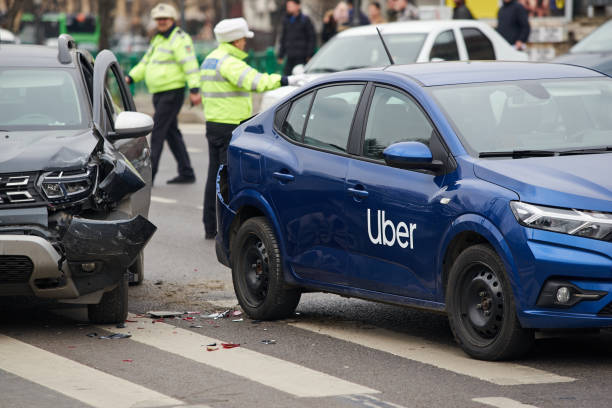Woodbury Rideshare Accident Lawyer
Do you need a Woodbury rideshare accident lawyer? If you or a loved one has been involved in an accident with an Uber, Lyft, or rideshare driver—whether as a passenger, another driver, or even a pedestrian—you have rights. Understanding these rights and navigating the complexities of rideshare accident claims requires the help of an experienced attorney. At Etemi Law, we are dedicated to helping victims of rideshare accidents receive the compensation they deserve.
Call us today at (203) 409-8424 for a


The Reality of Rideshare Accidents
Uber and Lyft have revolutionized transportation, providing millions of rides daily across the U.S. However, with the rise of these services, the number of rideshare-related accidents has also increased. Research from Rice University and the University of Chicago suggests that ridesharing services have contributed to a 2-3% increase in U.S. traffic fatalities since 2011, leading to up to 1,100 deaths annually.
Common Causes of Rideshare Accidents
Uber and Lyft drivers often operate under challenging conditions, increasing their risk of accidents. Some of the most common causes include:
- Distracted Driving – Relying on GPS, accepting ride requests, and managing passengers can divert a driver’s attention.
- Driver Fatigue – Many rideshare drivers work long hours or multiple jobs, leading to drowsy driving.
- Unfamiliar Routes – Navigating new areas can cause sudden stops or erratic driving behavior.
- Poor Vehicle Maintenance – Rideshare drivers are responsible for keeping their vehicles in good working condition, but lapses can lead to preventable accidents.
Connecticut Rideshare Laws and Regulations
Connecticut has strict laws governing rideshare companies and their drivers. These include:
- Mandatory Background Checks – Uber and Lyft must conduct background checks on all drivers, including a criminal record and driving history review.
- Vehicle Safety Requirements – Vehicles must pass inspections and meet specific safety criteria.
- Insurance Coverage – Rideshare companies must provide at least $1 million in liability coverage when drivers are transporting passengers.
- Driver Hour Limits – Uber and Lyft drivers can work a maximum of 14 consecutive hours and 16 hours in a 24-hour period to prevent fatigue-related accidents.
Who is Liable in a Rideshare Accident?
Determining liability in an Uber or Lyft accident can be complex, as multiple insurance policies may be involved. Our legal team at Etemi Law will investigate your case to establish liability and maximize your compensation.
If Another Driver is At Fault
- The at-fault driver’s insurance is the first line of compensation.
- If the at-fault driver is uninsured or underinsured, Uber/Lyft’s uninsured motorist coverage may apply.
If the Rideshare Driver is At Fault
- If the driver was logged into the app and waiting for a ride request, Uber/Lyft provides $50,000 per person/$100,000 per accident in bodily injury coverage.
- If the driver was transporting a passenger, Uber/Lyft provides $1 million in liability coverage.
- If the driver was off duty, their personal auto insurance applies.
Why You Need a Woodbury Uber and Lyft Accident Lawyer
Rideshare accident cases involve multiple insurance companies and complicated liability issues. Insurance companies often try to minimize payouts, but with an experienced attorney from Etemi Law, you can fight for the full compensation you deserve.
Our legal team will: ✅ Investigate the accident thoroughly ✅ Obtain key evidence, including rideshare records and driver logs ✅ Negotiate aggressively with insurance companies ✅ Take your case to court if necessary
Contact Etemi Law Today
If you or a loved one has been injured in an Uber or Lyft accident, don’t wait. Protect your rights and get the compensation you deserve. Contact Etemi Law today for a free consultation.
📞 Call us at (203) 409-8424 💻 Visit us online to schedule your case review
On Woodbury’s Route 6 (Main Street), winter turns routine rideshare pickups into tense, low‑light operations. Black ice and late‑season leaf slicks compress stopping distances as drivers merge from side streets, changing the mechanics of common crash patterns: low‑speed rear‑enders, side‑swipes near curbs and loss‑of‑control run‑offs. I watch how small shifts in pavement grip reframe injury risk and immediate care needs for riders and drivers alike.
Up toward Route 47, neighborhoods develop curious freeze‑thaw pockets where compacted leaves and shaded cul‑de‑sacs hide thin ice. Those microclimates force rideshare drivers into split‑second choices; the most common injuries we see are whiplash, clavicle and wrist fractures, and soft‑tissue strains. Local responders like the Woodbury Volunteer Ambulance Association navigate slowed roads, which can extend first‑response and transport times on the coldest mornings.
Serious crashes often require interfacility transfers when community evaluation hits capacity or imaging shows complex trauma. In Woodbury, routes along the Pomperaug River can develop freeze‑thaw lanes that slow ambulance access; transfers out to Waterbury or Danbury hospitals may add 15–40 minutes to transit, complicating handoffs between EMS and hospital teams. Those delays shape rehabilitation patterns — longer initial stays and staggered physical‑therapy starts, with earlier reliance on outpatient transport once roads clear.
I take an investigative view without hyperbole: rideshare injury timelines in Woodbury are often defined by season. Drivers under time pressure, invisible frost on parked cars, and passengers who delay evaluation until pain worsens all change the record of what happened. If you’re involved in a winter rideshare incident, document pickup and drop‑off locations, note weather and road conditions, and seek timely medical evaluation so treatment and timelines are clear.
